Walking on the beach offers more than just a chance to unwind. It gives you the chance to boost your fitness levels, work muscles that don’t always get attention, and enjoy a different setting from the typical gym environment. Here are 10 fantastic ways to transform your beach stroll into a complete body workout.
Believe it or not, turning a leisurely beach stroll into a powerful, total-body workout is quite simple. Beach walks offer the opportunity for a unique combination of low-impact, high-resistance exercises. The uneven surface of the sand forces your muscles to work harder to stabilize your body, while the natural resistance of moving through the sand can help burn more calories than walking on a flat surface. This means that a simple walk along the beach can become a comprehensive workout, targeting your legs, core, and upper body if you incorporate the right techniques.
If you’re ready to hit the beach for a solid workout, we have you covered. Here are 10 effective strategies to maximize the benefits of your seaside stroll. From adding strength-training moves to utilizing the natural landscape, these tips will help you get the most out of your time at the beach, ensuring you leave feeling stronger, fitter, and more energized.
Walk on different types of sand.
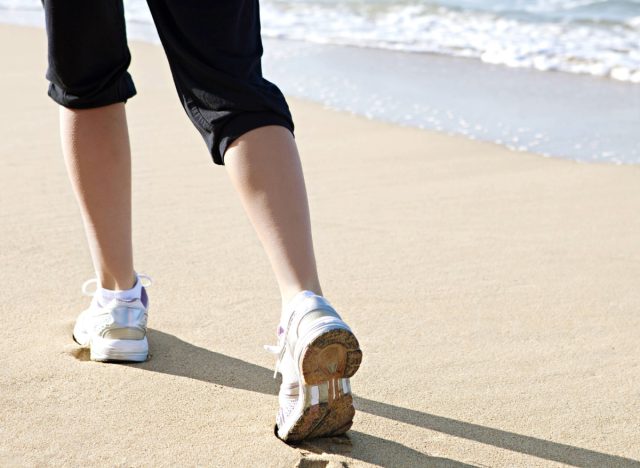

Walking on different types of sand can significantly enhance your workout. Soft, dry sand requires more effort to move through, which increases the intensity of your walk and helps build strength in your legs and glutes. The instability of soft sand engages your core muscles as they work to keep you balanced. Conversely, walking on wet, packed sand is easier on the joints and can be used for longer endurance walks, helping to build stamina and cardiovascular health.
Incorporate interval training.
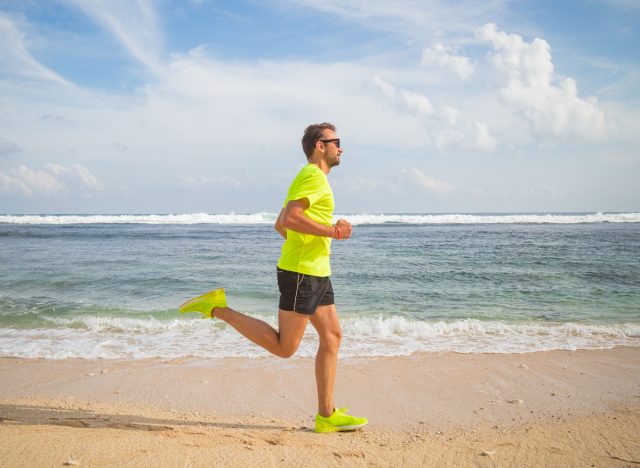

Interval training on the beach can elevate your heart rate and improve cardiovascular fitness. Try alternating between walking briskly on the packed sand and jogging or running on the softer sand. The varying intensity levels help burn more calories and enhance muscle endurance. This type of workout also keeps your routine interesting and challenging, ensuring you stay motivated and engaged.
Use the water resistance.
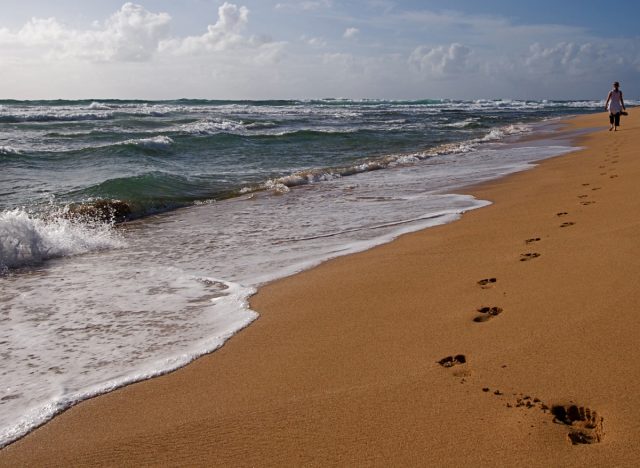

Walking in ankle-deep or knee-deep water adds resistance to your workout, making your muscles work harder. The water provides a natural form of resistance training, helping to tone your legs and core. The cool water can also help soothe your muscles and joints, making it an excellent option for a low-impact workout that still delivers significant benefits.
Add bodyweight exercises.
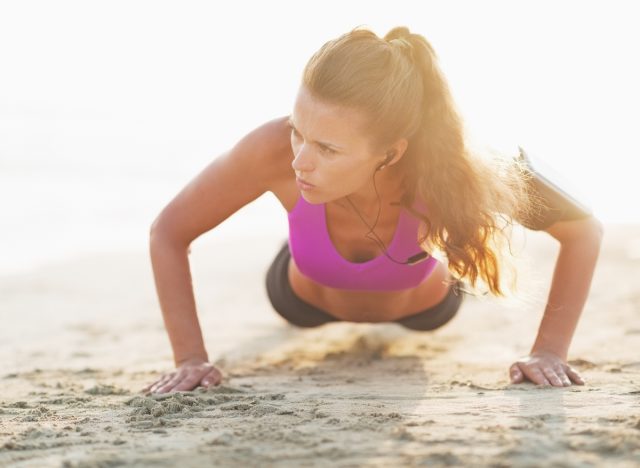

Incorporating bodyweight exercises into your beach walk can transform it into a full-body workout. Stop and perform exercises like pushups, squats, lunges, or planks every few minutes. The sand adds an extra challenge to these movements, requiring more effort to maintain balance and stability. This helps build muscle strength and endurance in your upper body, lower body, and core.
Carry light weights.


Carrying light weights during your walk can intensify your workout by engaging your upper body. Use small dumbbells or even fill water bottles with sand. As you walk, perform arm exercises such as bicep curls, shoulder presses, and lateral raises. This not only strengthens your arms and shoulders but also increases the overall calorie burn of your workout.
Try beach yoga.
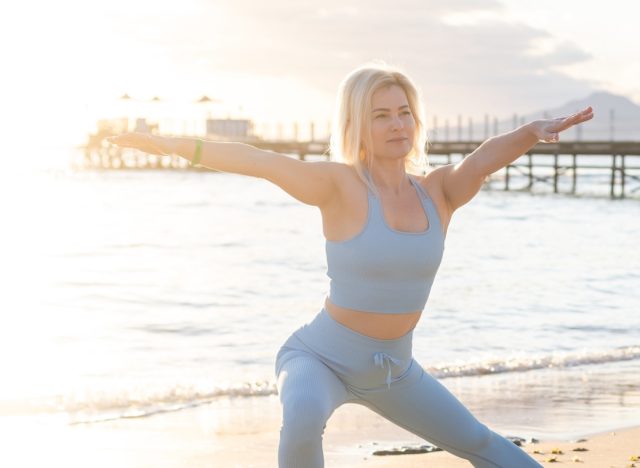

Combine your walk with some beach yoga to stretch and strengthen your muscles. Find a quiet spot on the sand and perform yoga poses that focus on balance, flexibility, and core strength. The sand adds an extra challenge to your balance, making your muscles work harder. Beach yoga can also help improve your posture and reduce stress, complementing the physical benefits of your walk.
Incorporate plyometrics.


Plyometric exercises, such as jump squats or burpees, can significantly boost the intensity of your beach workout. The soft sand cushions your joints, reducing the impact and risk of injury. These explosive movements help build strength, power, and agility, providing a high-intensity interval that complements the steady pace of your walk.
Utilize beach structures.
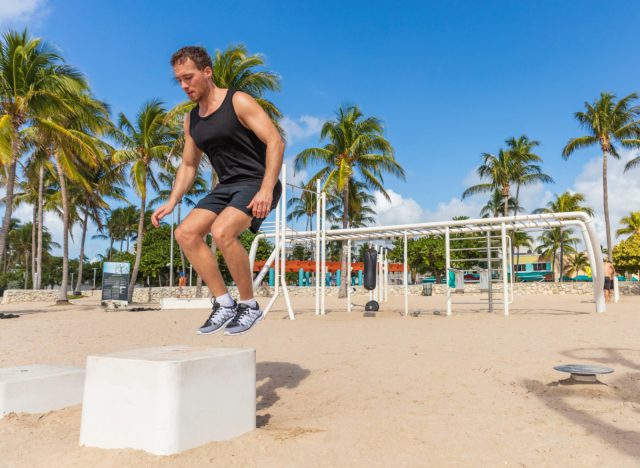

Make use of natural and man-made structures along the beach to add variety to your workout. Benches, driftwood, and rocks can be used for step-ups, tricep dips, or incline pushups. This adds a strength-training component to your walk and helps keep the workout interesting and engaging by incorporating different elements of your surroundings.
Practice mindful walking.
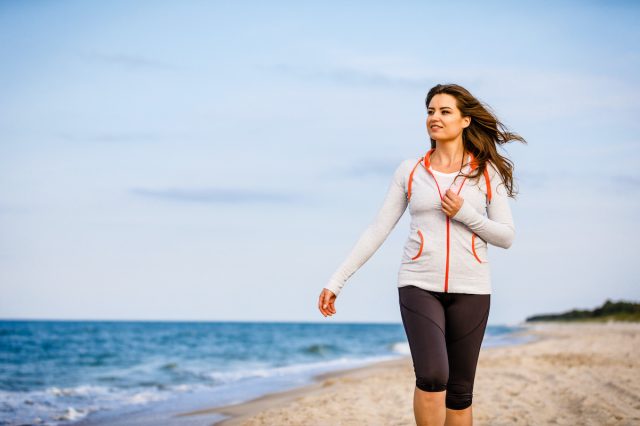

Full-body workouts don’t have to be only for your muscles. Mental strength is part of the game, too.
Mindful walking on the beach can enhance your mental well-being while providing physical benefits. Focus on your breathing, the sound of the waves, and the sensation of the sand under your feet. This mindfulness practice can reduce stress, improve your mood, and help you connect more deeply with your environment, making your workout a holistic experience that benefits both body and mind.
Cool down with a stretch.
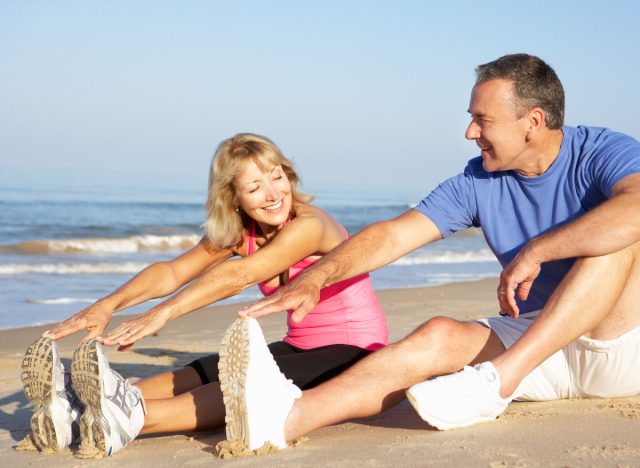

Finish your beach walk with a thorough stretch to improve flexibility and prevent muscle soreness. The sand provides a soft surface for stretching, allowing you to perform moves that target all major muscle groups. Stretching helps improve blood flow, aids muscle recovery, and enhances your overall flexibility, ensuring you get the most out of your beach workout.
Frequently Asked Questions (FAQs)
How long should my beach walk full-body workout be?
It is recommended to aim for at least 30 minutes to 1 hour of a beach walk full-body workout to ensure you engage all muscle groups effectively and get a good cardiovascular workout.
Do I need any equipment for a beach walk full-body workout?
No, you do not need any specific equipment for a beach walk full-body workout. Your body weight, the sand, and the water resistance will be sufficient to provide a great workout for all muscle groups.
Are there specific exercises I should include in my beach walk full-body workout?
While walking on the beach already engages multiple muscle groups, you can enhance your workout by incorporating exercises like lunges, squats, side shuffles, calf raises, and walking or running in the water to target different areas of your body.
Additional tips for a beach walk full-body workout:
- Stay hydrated by bringing water with you.
- Wear sunscreen to protect your skin from the sun.
- Listen to your body and take breaks as needed.
- Stretch before and after your workout to prevent injuries.






